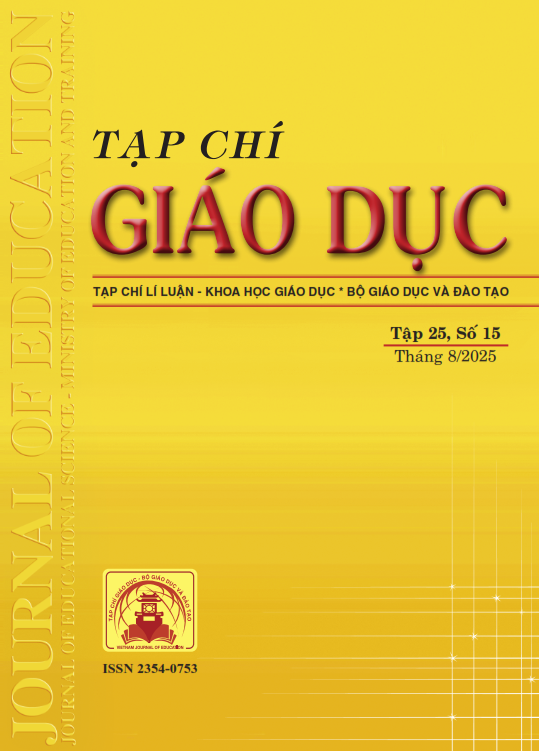Mối quan hệ giữa năng lực cảm xúc xã hội và cảm nhận hạnh phúc học đường của học sinh trung học phổ thông Việt Nam
Tóm tắt
In the context of Vietnam’s ongoing education reform, social emotional competence is regarded as a foundational factor in promoting holistic development and enhancing students’ school well-being. This study aims to examine the relationship between social emotional competence and school well-being among Vietnamese high school students, based on data collected from 2150 students using the EPOCH-S and SECQ scales. The findings indicate a moderate positive correlation between social emotional competence and school well-being among students. Regression analyses confirmed that social emotional competence is a statistically significant predictor of school well-being, accounting for 18.7% of the variance in overall scores and 20.4% when individual components of social emotional competence are considered. Among these, self-awareness, social awareness, positive relationships, and responsible decision-making showed notably positive effects. These findings provide both theoretical and practical foundations for designing interventions and educational strategies aimed at promoting students’ holistic development and enhancing school well-being in the Vietnamese educational context.
Tài liệu tham khảo
Barblett, M. (2010). Complexities of assessing social and emotional competence and wellbeing in young children. Australasian Journal of Early Childhood, 35(2), 13-18.
Beaumont, J., Putwain, D. W., Gallard, D., Malone, E., Marsh, H. W., & Pekrun, R. (2023). Students’ emotion regulation and school-related well-being: Longitudinal models juxtaposing between-and within-person perspectives. Journal of Educational Psychology, 115(7), 932-950.
Buerger, S., Holzer, J., Yanagida, T., Schober, B., & Spiel, C. (2023). Measuring Adolescents’ Well-Being in Schools: The Adaptation and Translation of the EPOCH Measure of Adolescent Well-Being - A Validation Study. School Mental Health, 15, 611-626. https://doi.org/10.1007/s12310-023-09574-1
Collaborative for Academic, Social and Emotional Learning [CASEL]. (2015). Effective Social and Emotional Learning Programs - Middle and High School Edition. CASEL GUIDE.
Domitrovich, C. E., Durlak, J. A., Staley, K. C., & Weissberg, R. P. (2017). Social‐emotional competence: An essential factor for promoting positive adjustment and reducing risk in school children. Child development, 88(2), 408-416.
Durlak, J. A., Weissberg, R. P., Dymnicki, A. B., Taylor, R. D., & Schellinger, K. B. (2011). The impact of enhancing students' social and emotional learning: a meta-analysis of school-based universal interventions. Child Development, 82(1), 405-432. https://doi.org/10.1111/j.1467-8624.2010.01564.x
Furkan, K. & Ozhan, M.B. (2021). Prediction of Academic Achievement and Happiness in Middle School Students: The Role of Social-Emotional Learning Skills. Inquiry in Education, 13(2), 15.
Gomez-Lopez, M., Viejo, C., Romera, E. M., & Ortega-Ruiz, R. (2022). Psychological well-being and social competence during adolescence: Longitudinal association between the two phenomena. Child Indicators Research, 15(3), 1043-1061.
JASP Team (2025). JASP (Version 0.19.3)[Computer software]. https://jasp-stats.org/
Jones, S. M., & Kahn, J. (2017). The evidence base for how we learn: Supporting students’ social, emotional, and academic development. National Commission on Social, Emotional, and Academic Development & the Aspen Institute.
Kern, M., Benson, L., Steinberg, E., & Steinberg, L. (2016). The EPOCH Measure of Adolescent Well-Being. Psychological Assessment, 28(5), 586-597. https://doi.org/10.1037/pas0000201
Raccanello, D., Vicentini, G., Trifiletti, E., & Burro, R. (2021). A Rasch analysis of the school-related well-being (SRW) scale: measuring well-being in the transition from primary to secondary school. International Journal of Environmental Research and Public Health, 18(1), 23.
Seligman, M. E. P. (2011). Flourish: A visionary new understanding of happiness and well-being. Simon and Schuster.
Steinmayr, R., Heyder, A., Naumburg, C., Michels, J., & Wirthwein, L. (2018). School-Related and Individual Predictors of Subjective Well-Being and Academic Achievement. Frontiers in Psychology, 9, 2631. https://doi.org/10.3389/fpsyg.2018.02631
Tian, L., Wang, D., & Huebner, E. S. (2015). Development and validation of the Brief Adolescents’ Subjective Well-Being in School Scale (BASWBSS). Social Indicators Research, 120(2), 615-634.
Zhou, M., & Ee, J. (2012). Development and validation of the Social Emotional Competence Questionnaire (SECQ). The International Journal of Emotional Education, 4(2), 27-42.
Tải xuống
Đã Xuất bản
Cách trích dẫn
Số
Chuyên mục
Giấy phép

Tác phẩm này được cấp phép theo Ghi nhận tác giả của Creative Commons Giấy phép quốc tế 4.0 .












